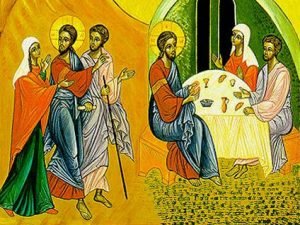I have been presenting some ideas about the Divine-Human origin of the “inspired books.” Since the people of Israel became known as the people of the Book because of their respect for the written law, it was natural that the doctrine of inspiration should first form around their concept of the origin of the Torah (the first five books of the Old Testament [OT]). According to the doctrine, which gradually took a more developed form, the Torah was caused by God before the existence of the world and was revealed to Moses by mental-oral instruction, or by delivery of the written text of the Pentateuch, or by literal dictation. This divine causation extended, even in the most material sense, to every part of the Pentateuch (though a few exceptions, e.g., the curses in Dt 28, were sometimes made), so that a plenary divine origin was ascribed to the entire Pentateuch. Under this influence, the doctrine of the divine origin of the Prophets and the Writings also sprang up. Yet here the divine causation was not conceived in such a plenary fashion. The Prophets and the Writings were written under the influence of the spirit of Yahweh, but this influence was not thought to be the cause of every jot and title, as in the case of the Torah. Nevertheless, the divine origin of the Prophets and the Writings was fully accepted; these books “soiled the hands” just as truly as did the books of the Torah.
[An aside. Given this very Semitic approach, we can see how Islam considers the Koran to be the exact dictation of Allah. We will see that Christians have various ideas about this same subject].
The doctrine of the divine origin of the sacred books was retained even by the Jews who absorbed Hellenistic ideas – thus, for instance, Philo who explained the pre-existence of the Torah in terms of Platonic ideas. It was Philo, too, who first adapted the Greek verb “to inspire” (katapnein) to express the divine origin of Scripture. Josephus (a Jewish historian) introduced the use of the Greek noun for inspiration (epipnoia) in this reference. His brief statement about the sacred books may serve to summarize the developed Jewish view about their origin: although long ages have now passed, no one has dared to add, remove, or change a syllable; and it is an instinct with every Jew, from the day of his birth, to regard them as the decrees of God, to abide by them, and, if necessary, to die for them gladly.
I shall attempt to present our ideas next!

